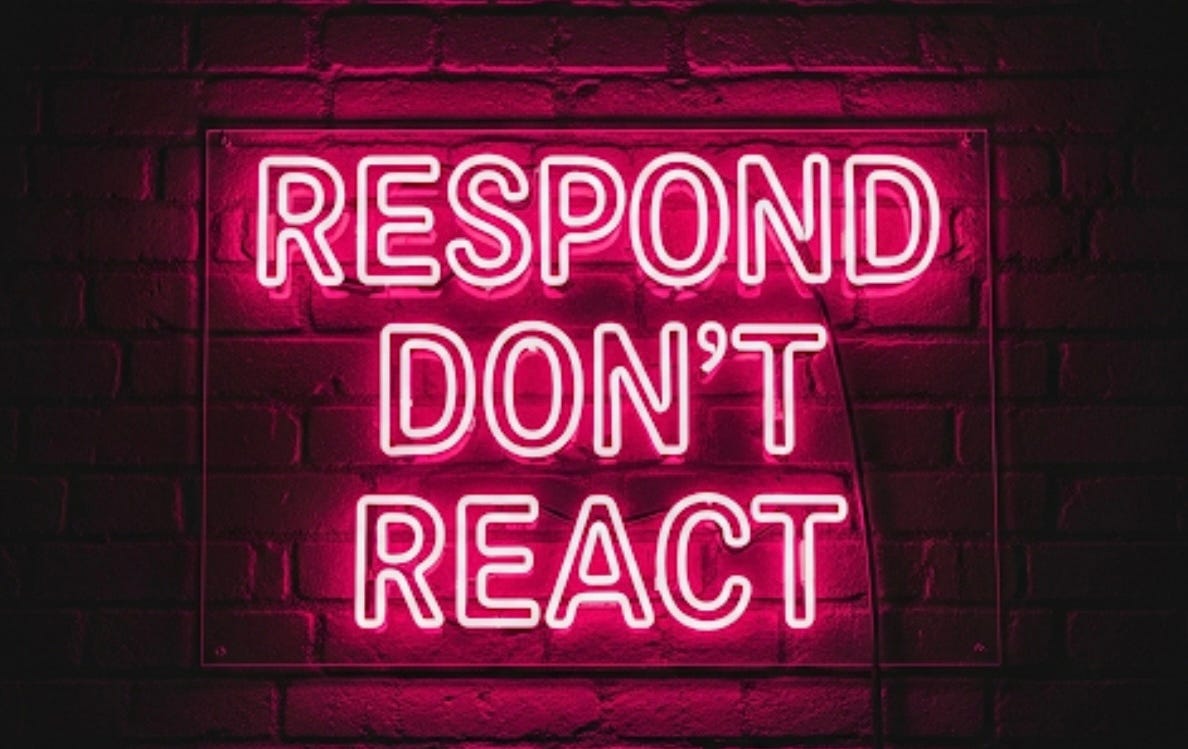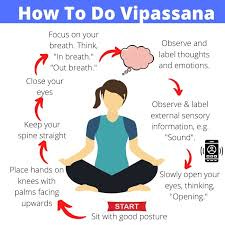Run Ragged? Learn to Respond Not React
The world is on fast forward, panicking us into constant action - but when we learn to respond not react, life becomes a lot more liveable. Here's how...
I lived for decades in a state of constant tension - believing I needed to always react.
I presented as confident and calm - but internally I suffered real anxiety at work or in relationships, with large chunks of days and even weeks feeling distracted, overwhelmed and fatigued. Only rarely was I able to step back and get some perspective.
Even when I made it to the top of BBC News, or to No10 Downing Street, I was in a state of constant tension - filling the gap between a request from my boss to see me and the actual moment with endless rumination about what I might have done wrong, or if I might be fired.
In relationships, I worried endlessly about having offended someone or not being good enough. Days could be filled with my mind turning in circles. It stopped me enjoying life for so long. When things got bad, I would wake in the small hours, catastrophising. When I tell people this, there reaction is often: “SNAP!”
I still have relapses - but they are fewer and further between.
And that’s because, I’ve learned: Respond Don’t React. And when I do that, things that appeared to be tigers turn out to be house cats; and events that feel as potentially catastrophic as an iceberg, melt away.
Let me explain how and why that approach is a magic bullet.
The world is on fast-forward. The pace of things can be head-spinning.
Some of this is a blessing. I am old enough to remember having to sit and wait for a programme to come on once a week – and if you were out, you would miss a crucial part of your favourite show.
In meetings, if someone didn’t arrive, you had no way of knowing why.
Getting somewhere required serious planning. The first time I used Uber, I was in New York and needed to get somewhere out in the sticks. I pressed the button and almost instantly a car pulled up and took me where I needed to go. I was in awe.
But these blessings have been unbalanced by a serious downside.
It was recently pointed out to me that I am a member of the last generation that will truly know the bliss of being uncontactable – or not to have streams of information coming at me from all angles, all the time.
Endless breaking news - where the next deadline is the time it takes to type a social media post; apparently no space to consider, analyse and respond. It has infected our media and our politics. It has infected us.
Countless - often pointless - emails are the blight of the workplace, endlessly interrupting our train of thought, demanding a reaction. Notification, notification, notification. Now. Now. Now.
We are trained to multi-task, be more efficient, cram more and more into a day so that we can apparently achieve and move forward. Our response is to react, react, react…
The impact is a downward spiral of more anxiety, more tension, more of a sense that it’s all too much.
I have always had a tendency to react: seeing a problem and instantly taking action, finding an emotion triggered, I allowed it to drive me, instead of standing back from it. The effect was to rob me of time, perspective and contentment. I was letting the agenda of my life be set for me.
Partly through age, partly through instruction from wiser people, I have learned to not grab hold of my first thought or feeling and run with it. Pausing, even for a little while, always helps – it allows a wiser, more sensible me to kick in. A me that understands:
The Chances are, what I am witnessing is unlikely to be as bad (or for that matter, good) as it first appears;
My first response is often distorted by emotion or negative thoughts;
A brief pause, or, even better, a night’s sleep helps me to see things more clearly.
It’s all very well telling people to pause rather than react – but it’s easier said than done. The point of a reaction is that it is instantaneous – like the way the lower half of your leg automatically kicks when a doctor taps you just below the knee. When it comes to our thoughts, feelings and words, we need to find a way to slow the process, creating a space between the trigger and our response.
As I write this - I’m dealing with the fallout of having let someone get under my skin. I asked them if we could do something a certain way - and they refused several times. When the time ran out on my sensible approach, they came back to me saying they had changed their mind. Explaining it was no longer an option they refused to understand why - blaming me for it no longer being on the table.
The result was I felt knocked off balance - and wanted to give them a piece of my mind. I was irritated at them for wasting my time. They had reacted, rather than taking a moment to think and respond with the right answer. And now I was starting to react too. I forced myself to pause, knowing that in the scale of things this was nothing. More to the point I had explained to them and they couldn’t or wouldn’t see. Angsting - or, worse, shouting at them - would only make it worse and I would carry the burden of it all for so much longer. But I needed to push myself to get to that place…
I practise something called Vipassana meditation. The simple idea is that you try to concentrate on monitoring your breathing. The mind can’t really focus on more than one thought – so the chatter stops. After a period of daily practise, you begin to notice that the world seems to slow – you have time to respond not react.
This is part of a conversation I had on meditation with Michael Singer, the author of one of my favourite books, “The Untethered Soul”:
CRAIG: I was a bit confused about meditation at first and thought it was more complicated than it really is. For me, it’s a way of clearing your mind and just being present. And what I think it teaches you to do is respond and not react. Before I was meditating, I was reacting a lot to things. It was instantaneous, I was annoyed or fed up or suddenly felt sad about something. And what meditation does is slow things so that you're then willing to actually respond and think rationally about it - be more balanced, be more centred.
MICHAEL: And I liked that you said, your mind slows. You're thrashing around, and that's causing all the trouble. If you stop thrashing, what happens is you step back. And basically, that allows you to have peace and be centred…you'll do better in life, you’ll do better in relationships, do better in every single thing you do, if you could come from a place like that.
I love those last two sentences. You can get to a stage where you can deal with anything if you work on yourself. And a big part of working on yourself is slowing down.
Here’s how you do it. You sit in a comfortable position, close your eyes and notice your breathing. I find myself attracted the upper part of my nostrils where the cool air I breathe is pulled down towards my lungs, and then the carbon dioxide, warmed by my body flows out. Quickly you see there is a pattern: breathe-in; a short pause; breathe out; a short pause, repeat.
Another technique is to count to four as you breathe in, and count to four as you breathe out.
Both of these are harder than you might think. Often the mind dives in with pointless chatter almost instantaneously, and it takes a while to realise that you are lost in thought. After returning to your breath, it happens again. And again….And again…
Many people are endlessly frustrated by the discovery that it is almost impossible to stop thinking – and they give up, insisting meditation is not for them. They are missing the point - which is stop attaching to your thoughts and letting them impact you.
Some people who are really suffering hate the fact that their demons come out to play, taunting them with endless negativity while they meditate. They have my sympathy. There are points where I have experienced this – and it takes real bravery to confront what is in there and try to train the mind not to focus on it. At this point you really need the help of a trained therapist or mature and kind guide. All I can say is that sticking with it, practising, climbing back on board every time I fell off really helped me.
It is common for teachers to say that the state you are trying to get to is seeing thoughts and feelings as like clouds appearing and travelling across your mind; the point is to notice them, but not engage and get back to being in the moment.
As I have meditated, I have managed to stop – or at lease severely limit - catastrophising – which is a reaction to thoughts and feelings.
Time after time, my instinct is to jump in. When I stop myself from reacting and take the time to respond, I see with different eyes. Those glimpses of a tiger that I feared might attack, reveal themselves to be a pet cat; those icebergs I feared I was steaming towards, melt; the one precious life I have been given seems so much more appealing.
Notes:
Me talking to Michael Singer on Desperately Seeking Wisdom
https://www.desperatelyseekingwisdom.com/episodes-series-2/desperately-seeking-wisdom-michael-singer










I always look forward to your Sunday morning Substack, Craig. This is SO helpful and I’m sure anyone who struggles to keep on track with meditation will be able to find encouragement in what you have shared.
Again, you have hit upon something I attempt to express to kids. Almost daily. “Connections” was my word last year and in this piece I see a distinct connection to the collapse of time. Humans created the construct of time but the react/response option indicates to me the crucial use of this construct. Something we must train in and develop. Meditation is the arena for this training.
Spot on Craig. Your writings support and echo my experiences.